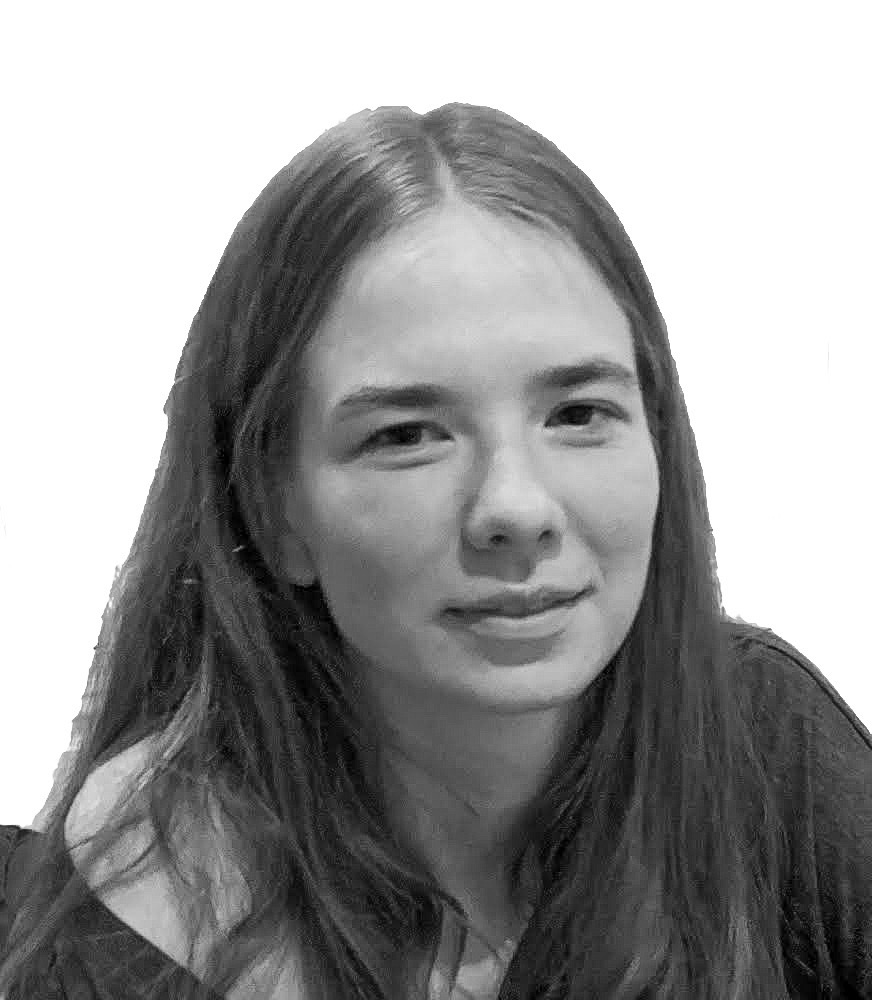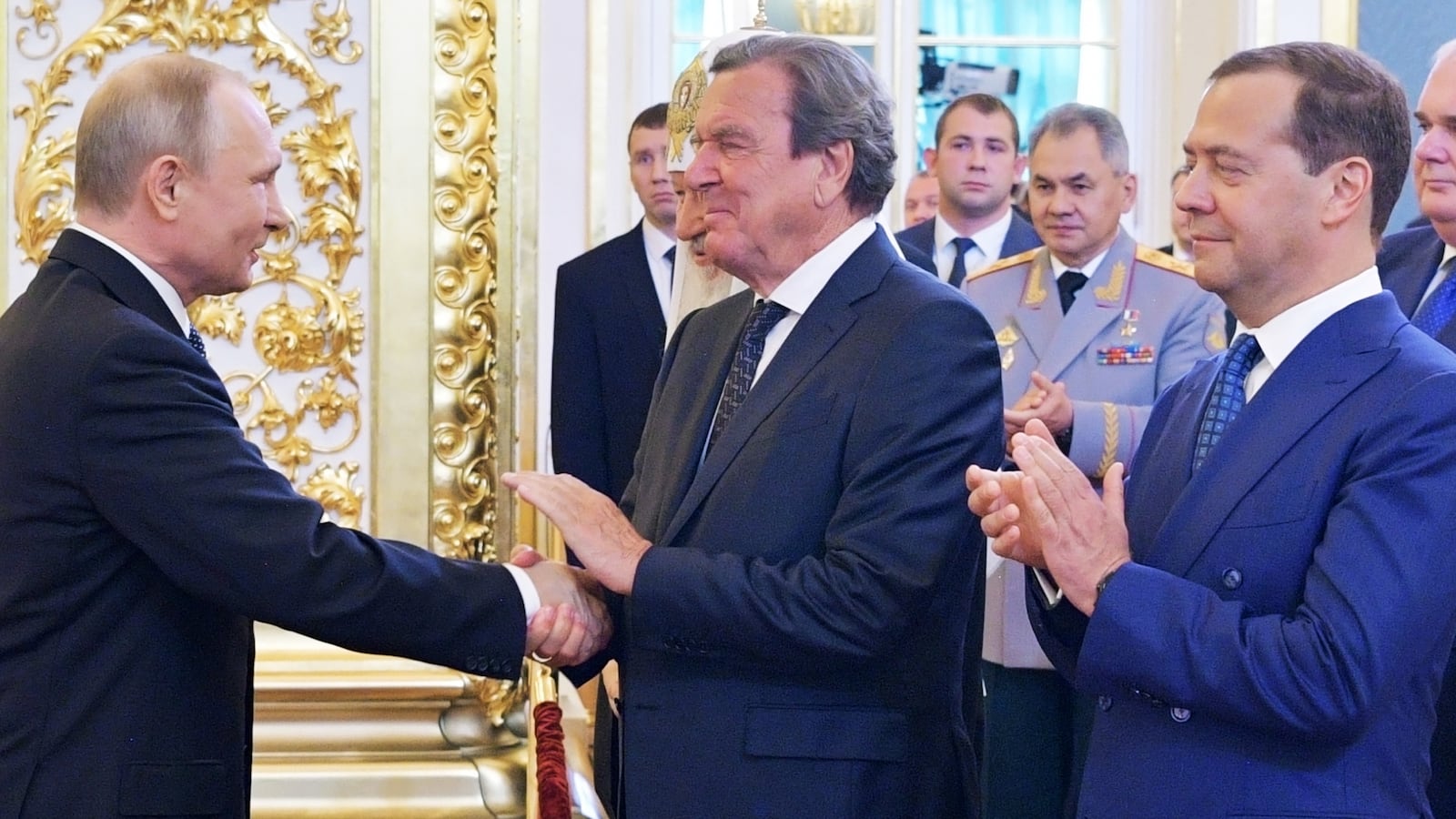BERLIN—One of Europe’s formerly most respected Social Democrats has three failed marriages, a brand new wife half his age, and a widely reported occasional drinking problem. Rumor has it he is also one of the few people in the world with Vladimir Putin’s mobile phone number.
So it was that Monday at President Putin’s latest inauguration, after more than 1,600 anti-Putin protesters were arrested across Russia, the ex-German Chancellor Gerhard Schröder stood sandwiched obediently between the Russian patriarch and the prime minister, and one row ahead of the washed-up action star and internet meme Steven Seagal (Italy’s Silvio “Bunga Bunga” Berlusconi canceled). Perhaps Putin’s last non-radical Western ally, Schröder was one of the only three people who got to shake the president’s hand for the all the cameras.
Since Schröder lost his re-election bid in 2005, he has cashed in on his rep by taking jobs with the Russian state-owned energy companies Rosneft and Gazprom, although he is no expert on gas or oil. He says he does the lobbying work “out of friendship” that has “no political meaning.” Anyone who has a problem with that, as the 74-year-old likes to say, “can suck it.”
Indeed, a six-figure salary is not something exclusively available at Russian energy companies. And the former chancellor seems happiest when he is bossing around the northern German soccer team on whose board he sits pro bono. “The Kremlin uses Schröder to mould its narratives,” Stefan Meister, who works at the German Council of Foreign Relations, tells us. “But I think that he genuinely thinks his business activities contribute to improving relationships between Germany and Russia.”
Anyone familiar with the vicissitudes of the ongoing Trump-Russia saga in the United States will have caught a glimpse of the way Putin likes to use oil money to win friends and influence politicians. But in Schröder’s case, some of this has to do with history.
When Schröder was born in 1944, his father, a soldier in the German Wehrmacht, wrote from Romania that he would be home in the fall. He never came home. Later, in the mid-’70s, when Germans still clung to the illusion that at least ordinary soldiers had remained “professional” on the Eastern Front, Schröder traveled to Russia as part of a delegation of young Social Democrats.
He visited a power plant in the Russian countryside and met a tour guide whose son had died trying to defend it. There was an exhibition with photographs that Schröder had not seen before. Some of them showed the brutal mass executions that were carried out by Wehrmacht soldiers (PDF).
Fast-forward to 2001, a few weeks after the Sept. 11 attacks. Schröder was the German chancellor and Vladimir Putin was in Berlin to give a speech in the Bundestag. The new Russian president pledged friendship to the U.S. He also spoke in German, having previously been a KGB agent working along with the East German police in Dresden. The chancellor was touched when Putin said, “Russia has always harbored special feelings for Germany.“
“We Germans carry a responsibility towards Russia,” Schröder said in an interview with the Süddeutsche Zeitung in 2016, referring to the 20 million people who died in the Soviet Union between 1941 and 1945. He mused that he and Putin were connected by the fact that both their families had suffered in the war: “I lost my father, Putin’s brother died during the German occupation of Leningrad, his mother almost starved to death.”
“Schröder’s guilt complex is a pattern that you have in the older generation of Germans,” says Meister. “I think Putin knows about these feelings and he plays with it.”
That explanation works well for some of Schröder’s erstwhile admirers. In a former artist colony in the north of Germany, which was once the battleground for a green protest movement against atomic energy, the landlord of the local steak house still has a picture of Gerhard Schröder, who used to be his state’s minister-president, hanging on the wall. Even after Schröder was elected to the board of the dirtiest oil company in Russia last year, I discovered on a visit, the portrait’s still hanging there.
Rosneft, which is subject to Western sanctions, is Schröder’s latest employer and has the greatest oil and gas reserves in the world. Schröder’s salary is not public information yet. But Matthias Warnig, the German ex-Stasi spy officer who stood behind Schröder at the pseudo-coronation yesterday, works for Nord Stream, the daughter company of Gazprom. And his salary for 2016 has been reported by Rosneft as $580,000.
A moderate sum, it seems, given that Rosneft’s board of directors tried to order tableware for their private jet for the sum of $83,000 last spring. If the company’s employees hadn’t leaked the shopping list to the corruption-fighting opposition leader Alexei Navalny (who was also detained this weekend), the silver spoons would have cost $260 each.
It’s worth noting that, according to a profile published in the Süddeutsche Zeitung last fall, in Putin’s modern day kleptocracy a geologist who works as a scientific adviser to the Russian Ministry of Resources and has a Ph.D. earned back from the time when scientists in the USSR were taught foreign languages so that they would be able to read Western papers but not converse with their colleagues, can hope to earn around $50 per month.
Maybe the ex-chancellor’s sense of responsibility is getting lost in translation. “When German politicians like Schröder go to Moscow, they mainly have elite contact and very limited contact to the normal Russian people,” Meister points out. “If they only go to meetings with Putin and his cronies, then of course they are somewhat blind.”
But there was Schröder on Monday for the whole world to see.





